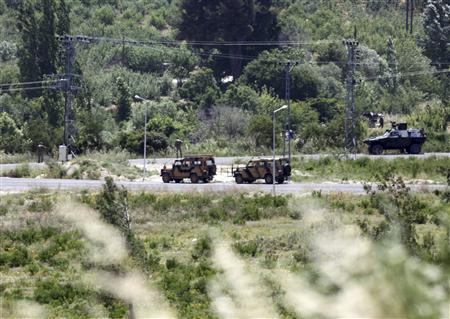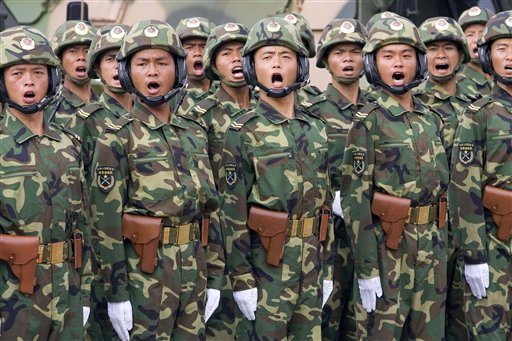Syrian artillery on Sunday pounded the rebel city of Rastan, killing seven civilians, monitors said as the Red Cross delivered aid to refugees from the battered Homs quarter of Baba Amr but remained barred from the district itself.
For a third straight day relief agencies were denied entry to Baba Amr, where hundreds of people are reported to have been killed and even more wounded in an almost month-long blitz.
The shelling of nearby Rastan came despite a call from China on all parties to “unconditionally” end the violence which reportedly sent more civilians fleeing across the border to Lebanon.
The Syrian Observatory for Human Rights said 11 people were killed on Sunday across Syria, including seven who died when a rocket hit a Rastan house. Four children were among the dead.
Saudi Foreign Minister Prince Saudi al-Faisal urged Russia to “advise” its ally Syria to stop its deadly crackdown, and reiterated his view that the opposition should be armed.
“Since dawn, the positions of deserters in the north of Rastan have been subject to intensive shelling,” Observatory chief Rami Abdel Rahman told AFP in Beirut.
Rebels on February 5 declared Rastan “liberated” from President Bashar al-Assad’s control, but since Homs was overrun by regime forces on Thursday, army deserters have been braced for an onslaught on Rastan and Qusayr, also near Homs.
Meanwhile 35 Syrians from Qusayr fled to northern Lebanon on Sunday, a spokesman for Syrian refugees in the Mediterranean country, Ahmad Mussa, told AFP.
The latest deaths in Rastan raised to at least 19 the number of civilians killed across Syria on Sunday, the Observatory said. It also reported the death of a soldier in the northwest province of Idlib.
An air force intelligence building at Harasta in Damascus province was also attacked by rocket-propelled grenades, the Observatory told AFP, without providing further details.
AFP was not immediately able to verify the Observatory’s reports because of restrictions on foreign journalists in Syria.
Rebels withdrew from Baba Amr in Homs on Thursday in the face of a ground assault by regime forces after a near-month of bombardment that the US-based Human Rights Watch said had killed some 700 people.
HRW said shells sometimes fell in Baba Amr at a rate of 100 an hour, and that satellite images showed 640 buildings visibly damaged, but stressed that the real picture could be worse.
The International Committee of the Red Cross said it delivered relief supplies on Sunday to refugees from Baba Amr in a nearby village as Syria continued to deny the ICRC access to the devastated district of Syria’s third largest city.
“We have started to distribute humanitarian aid in Abel village, three kilometres (two miles) from Baba Amr,” ICRC spokesman Saleh Dabbakeh told AFP.
“Many refugees from Baba Amr are in Abel,” he said, adding they were being given food and blankets.
Dabbakeh said a similar operation would take place in Inshaat, another Homs district.
A seven-truck aid convoy has been waiting since Friday to enter Baba Amr, with the authorities saying they were being barred for their own safety because of the presence of bombs and landmines.
The delay has provoked international outrage, which Saudi Arabia joined on Sunday, urging Syria’s “friends” to press Damascus to heed global calls to end the violence.
“International efforts, unfortunately, failed and we have not seen results to stop the bloodshed and massacres in Syria,” Saudi Foreign Minister Prince Saud al-Faisal told reporters in Riyadh.
“Syria’s friends should advise them to stop the killings. We hope that Russia and others will advise them… we want freedom for the Syrian people.”
Syria’s arch-enemy Israel, meanwhile, offered to send humanitarian aid to civilians via the Red Cross.
“The Jewish state cannot stand by without doing a thing while atrocities are taking place in a neighbouring country and people are losing their whole worlds,” Israeli Foreign Minister Avigdor Lieberman said.
Jordan, another Syrian neighbour, appealed for a diplomatic solution.
“We hope there will be an end to the crisis in Syria through diplomatic and political channels,” Prime Minister Awn Khasawneh told a Turkish parliamentary delegation.
Syrian opposition activists say the regime is using delay tactics to erase signs of their “crimes” in Baba Amr before allowing in relief workers.
British photographer Paul Conroy, wounded in a rocket attack in Baba Amr on February 22 that killed two colleagues, said the bombardment amounted to a “mediaeval siege and slaughter.”
The bodies of American journalist Marie Colvin and French photographer Remi Ochlik, killed in the rocket attack, were flown into Paris from Damascus on Sunday.
China, which twice joined Russia in blocking UN Security Council resolutions against Syria crackdown on dissent, has also urged an end to the violence.
But a foreign ministry official quoted by Xinhua news agency said China is against foreign interference in Syria, where the United Nations says more than 7,500 people have been killed since March last year.











